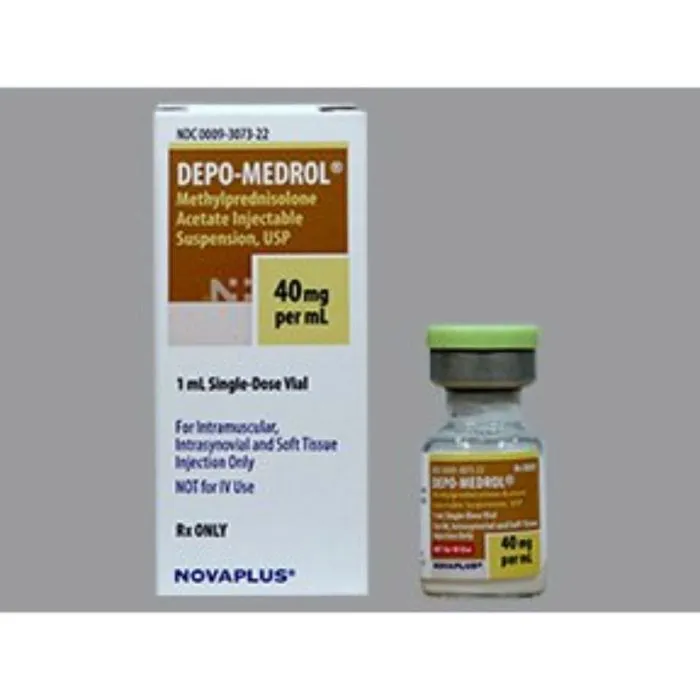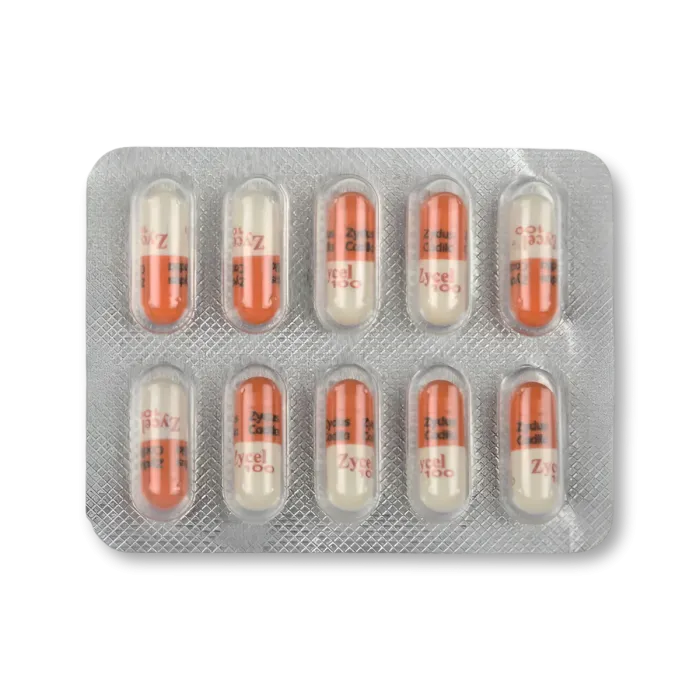Medrol is a medicine that doctors often prescribe to treat inflammation in the body. It is commonly used for problems like Arthritis, Asthma, skin conditions, and allergic reactions.
The main ingredient in Medrol is Methylprednisolone, which is a type of corticosteroid. This medicine works by calming the immune system and reducing swelling. While Medrol is helpful in many conditions, it also comes with some side effects.
Like any powerful medicine, Medrol needs to be taken with care. Some people may face mild problems, while others may experience more serious effects. That is why it is important to know what can happen when you take Medrol.
In this article, we will explain the possible Medrol side effects, so you can stay safe and informed.
How Medrol works and why side effects happen
Medrol (Methylprednisolone) is a strong corticosteroid used to control inflammation in conditions like Arthritis, Asthma, Lupus, skin allergies, and inflammatory bowel disease. It works by copying the action of natural steroids made by your adrenal glands, helping to reduce swelling, redness, and pain.
However, while Medrol calms the immune system to relieve symptoms, this same action can also weaken your body’s ability to fight infections and affect other normal processes. That is why side effects can occur, especially with high doses or long-term use.
Medrol is available in both tablet and injection form in various strengths, including Depo-Medrol 40 mg Injection.
While many people worry about side effects, it’s important to know that this medication carries side effects similar to most other commonly used treatments. With the right dosage and doctor’s guidance, it’s both safe and effective for long-term use.
Save up to 90% on your medicine bills

Depo-Medrol 40 mg Injection 1ml

Zycel 100 Capsule

Celcox 200 mg Capsule

Medrol 4 mg Tablet
Common side effects of Medrol
Some side effects of Medrol are mild and short-term, especially when the medicine is used for a short period. The side effects of the Medrol tablet are the same as Medrol injection side effects.
Let us take a look at the common ones:
- Upset stomach: Some people feel nausea, vomiting, or stomach pain when taking Medrol. It’s best to take it after food to avoid this.
- Increased appetite and weight gain: Medrol can make you feel more hungry than usual. Over time, this may lead to weight gain.
- Mood changes: Many users report feeling more anxious, irritable, or even depressed. Some may have mood swings or feel nervous.
- Difficulty sleeping: Medrol may cause insomnia, especially if taken later in the day. Taking the dose in the morning may help reduce this.
- Swelling in hands and feet: This can happen because of fluid retention, a condition where your body holds on to water and salt.
Serious Medrol side effects
When Medrol is taken for a long time or in high doses, it can lead to more serious side effects. These are not very common, but still important to know.
- High Blood Pressure: Taking steroids like Medrol can cause blood pressure to rise. If you already have High Blood Pressure, this can be risky.
- Weakening of bones (Osteoporosis): Medrol can reduce the strength of your bones over time. This may increase the risk of bone fractures, especially in older adults.
- Increased blood sugar: Medrol may raise blood sugar, which is dangerous for people with Diabetes or those at risk of it.
- Slow wound healing: Because Medrol weakens the immune system, cuts and wounds may take longer to heal. There is also a higher risk of infections.
- Muscle weakness: Long-term use can cause muscle thinning or weakness in the arms and legs.
- Eye problems: Some people may develop Cataracts or Glaucoma, especially if they use Medrol for many months. Regular eye check-ups are advised.
Rare but dangerous side effects
There are some rare side effects that need immediate medical attention:
- Severe allergic reactions: The symptoms include rash, itching, swelling, or difficulty breathing.
- Mental health changes: Hallucinations, confusion, or extreme mood changes.
- Stomach ulcers or bleeding: The symptoms include black stools or vomiting blood.
- Pancreatitis: It is the inflammation of the pancreas, which causes sharp stomach pain, nausea, and fever.
If you notice any of these symptoms, stop the medicine and call a doctor right away.
Withdrawal and its risks
When Medrol is used for more than a few weeks, your body may stop making its own natural steroids. This is called Adrenal suppression.
If Medrol is suddenly stopped, you may feel very sick. Symptoms of this include:
- Extreme tiredness
- Weakness
- Body aches
- Low Blood Pressure
- Light-headedness
To avoid this, your doctor will slowly reduce the dose instead of stopping it suddenly.
Who should avoid Medrol?
Not everyone should take Medrol. It may not be safe for people with:
- Active infections
- Tuberculosis
- Liver or kidney disease
- Mental health conditions
- Stomach ulcers
Always share your complete medical history with your doctor before starting Medrol.
Medicine interactions
Medrol can affect the way other medicines work. Some medicines that may interact with Medrol include:
- Blood thinners like warfarin
- Diabetes medicines
- Vaccines (Medrol may weaken the effect of vaccines)
- Nonsteroidal Anti-Inflammatory Drugs (NSAIDs) like ibuprofen
Tell your doctor about all the medicines and supplements you are taking, including herbal ones.
How to take Medrol safely?
To avoid side effects and get the best results from Medrol:
- Take it exactly as your doctor prescribes.
- Start with lower doses like Medrol 4 mg.
- Do not stop it suddenly.
- Take it with a meal to avoid the chances of stomach upset.
- Try to take it in the morning to reduce sleep problems.
- Go for regular check-ups if you are on long-term Medrol.
- Watch for signs of infection or high blood sugar.
- Take a healthy diet to avoid weight gain and bone loss.
Conclusion
Medrol can be a powerful and helpful medicine for reducing inflammation and treating serious health conditions. But like all strong medicines, it needs to be taken with care. Knowing the possible side effects, both common and serious, can help you stay safe and prepared.
Always take Medrol exactly as your doctor advises, and do not stop it suddenly without medical guidance. Watch out for any changes in your mood, weight, blood pressure, or overall health.
With the right dose, proper monitoring, and a healthy routine, you can lower the chances of Medrol side effects and get the full benefits of this medicine. Being aware is the first step to being safe.

Frequently Asked Questions
How long do Medrol side effects last?
The duration of Medrol side effects depends on the dose, treatment length, and individual response. Mild side effects usually go away after stopping the medicine. However, some effects, like weight gain or mood changes, may take weeks to fade. Long-term use may cause lasting effects that need medical monitoring.
Is Medrol a type of painkiller?
No, Medrol is not a traditional painkiller like paracetamol or ibuprofen. It helps reduce pain by lowering inflammation in the body. It works differently and is usually prescribed for conditions involving immune system issues or long-term inflammation.
Can Medrol be taken during pregnancy?
Yes, but only if your doctor says it is safe. In some cases, steroids may harm the baby or cause low birth weight. If you are pregnant or planning to become pregnant, let your doctor know before taking this medicine.
Is Medrol the same as prednisone?
Yes, Medrol and Prednisone are both corticosteroids used to reduce inflammation. However, they differ in strength, how the body processes them, and dosing. Your doctor will suggest the medicine as per your health needs and medical condition.
Should I take calcium supplements with Medrol?
Yes, if you’re using Medrol for a long time, calcium and vitamin D supplements are often recommended. Medrol can weaken bones over time, so supplements may help reduce the risk of osteoporosis and maintain bone strength during treatment.
Is Medrol a harmful steroid?
No, Medrol is not harmful when used correctly under medical supervision. It can be effective for treating inflammation and immune-related conditions. However, misuse, high doses, or long-term use can lead to some serious side effects, like bone loss and infections.
Cheap Medicine Shop only refers to credible, authoritative sources for our content. If you’re curious about how we ensure the integrity of our content, we encourage you to read our Content Information Policy.














